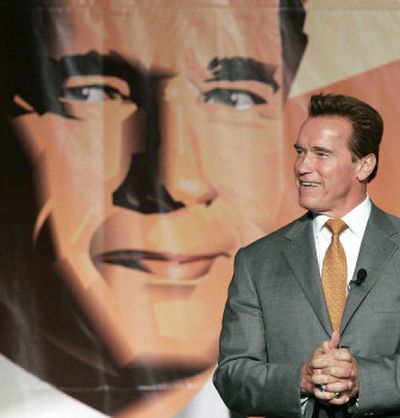Schwarzenegger win came from the center

LOS ANGELES – In his victory speech Tuesday night to a confetti-swamped crowd at the Beverly Hilton, Gov. Arnold Schwarzenegger had a message for the rest of the Republican Party after its worst defeat in decades.
Follow “the California way,” he said. “We are proving to the nation that there is another way to go, a better path to solve problems.”
Schwarzenegger’s landslide victory in a largely Democratic state illustrates the growing power of moderate candidates and the electoral appeal of bipartisanship, and it could contain important lessons for Republicans and Democrats as they seek to position themselves in the future, analysts and politicians said.
“If I was a Republican National Committee chair, I would hire Arnold out and teach Republicans what is necessary to put together a winning campaign,” said Sherry Bebitch Jeffe, a political analyst at the University of Southern California. “He really is the poster boy of what Republicans have denied for so long. Elections are won from the center.”
In the triumph over Democratic nominee Phil Angelides, described even by his own partisans as a somewhat lackluster performer, Schwarzenegger owned the center. According to an exit poll of more than 2,000 voters done by CNN, almost 60 percent of California’s independent voters chose Schwarzenegger, while 58 percent of the people who identified themselves as moderate cast ballots for him. Even 22 percent of Democratic voters voted for the governor.
The reason for this landslide, analysts said, involved the 180-degree reversal Schwarzenegger has undergone in the past year. Schwarzenegger rolled into office on the back of an unprecedented recall election in 2003, promising to govern from the center. For the first year of his administration he did just that. But in late 2004, he embraced partisan tactics. He addressed the Republican Convention, stumped for President Bush in Ohio during a critical period in Bush’s re-election campaign, and then, in early 2005, decided to take on all the entrenched-Democratic Party interests in Sacramento at once, including teachers, nurses and prison guards.
“Arnold did this Karl Rove-inspired move to the right,” said Bruce Cain, a professor of political science at the University of California at Berkeley. “He got carried away with the ‘base’ strategy because it worked in 2004. He tried a little bit of Bush politics in California.”
The result? Miserable failure. Schwarzenegger pushed a series of ballot initiatives, and in June 2005, Californians defeated all of them.
“Schwarzenegger in 2005 was like an action hero playing Shakespeare,” said Don Perata, the leading Democrat in the state Senate. “He wasn’t comfortable.”
The plot twists that followed rivaled any of the former action hero’s movies. He apologized to the voters and changed character. He hired a Democrat as his chief of staff and cut bipartisan deals to limit global warming, boost the minimum wage and reduce the cost of prescription drugs. He clashed with Bush over sending the National Guard to the Mexican border and environmental issues. And he embraced a Democratic Party-inspired, multibillion-dollar bond package to rebuild California’s crumbling roads, levees, ports and schools. Democratic lawmakers, including Perata, campaigned side by side with Schwarzenegger to get the bonds passed, which they did.
As Schwarzenegger said Tuesday night, “I just love doing sequels.”
Schwarzenegger’s bipartisanship immunized him against attacks by Angelides that a vote for Schwarzenegger was a vote for Bush. Indeed, according to the CNN exit poll, 55 percent of the voters who said they “somewhat disapproved” of the president, voted for Schwarzenegger.
On Thursday, during a two-day trip to Mexico, Schwarzenegger actually sounded satisfied with a nationwide Democratic victory, theorizing that it might be what the country needs to force cooperation.
“I think this is good that we have new blood coming to Washington, that we have new people with new ideas coming to Washington,” the governor told reporters, “because Washington was stuck.”
A Democratic shift in the country might actually help Schwarzenegger’s political future. He is rumored to be considering a run for the U.S. Senate in 2010 to replace Democrat Barbara Boxer.
Another factor that might hold lessons for the country involves California itself. For years, the state has been a laboratory for mean-spirited partisan political campaigns. It has been one of the leaders in spending on negative campaign ads and one of the first states where political consultants experimented with targeted mailings and robo-calls. The 2002 gubernatorial campaign is considered one of the nastiest in the nation’s history.
“So,” Cain said, “we’ve gotten sick of partisanship first.” Schwarzenegger ran a reasonably clean campaign against Angelides. Perhaps the most negative ad was a lighthearted spot that showed Angelides moonwalking backward as it said he planned to take California back in time.
Patrick Dorinson, communications director for the California Republican Party, said he thinks the message in Schwarzenegger’s victory is that results, not ideology, guaranteed victory.
The alternative, he suggested is “to be ideologically pure and lose.”
Schwarzenegger, he said, subscribes to the “big tent” idea of the Republican Party as enunciated by Ronald Reagan in the 1960s. Despite his reputation as a hard-line conservative, as California governor Reagan worked well with Democrats, raised state taxes and signed into law what was, for the time, one of the most liberal abortion laws in the nation.
“You mention ‘big tent’ to some Republicans now and they say, ‘No way, we can’t have that,’ ” Dorinson said. “We’ve gotten away from this idea, but that was a mistake. The center is where the future is.”
Indeed, Schwarzenegger’s victory reminded Republicans, said political consultant Allen Hoffenblum, that you cannot get elected by the base alone. Schwarzenegger kept his base; more than 90 percent of Republicans voted for him. But he won because of his broad appeal.
“The Bush obsession with the base, the base, the base doesn’t work here,” Hoffenblum said. “I think this election showed that it doesn’t work anywhere else either.”